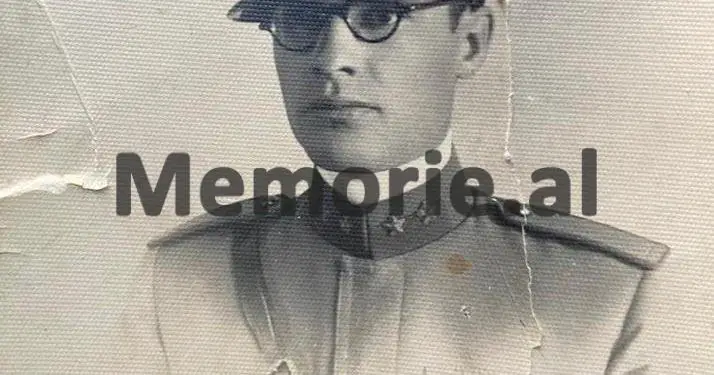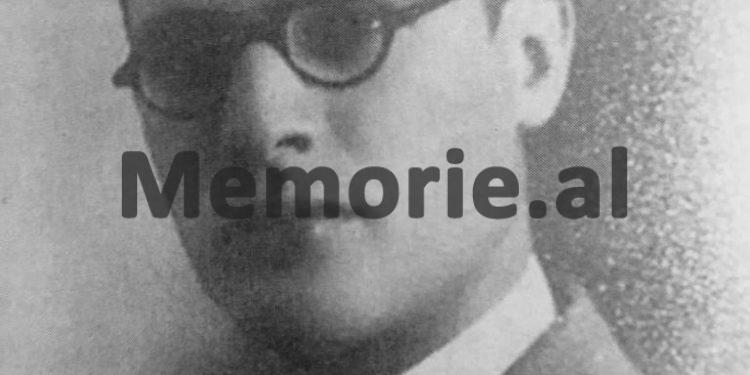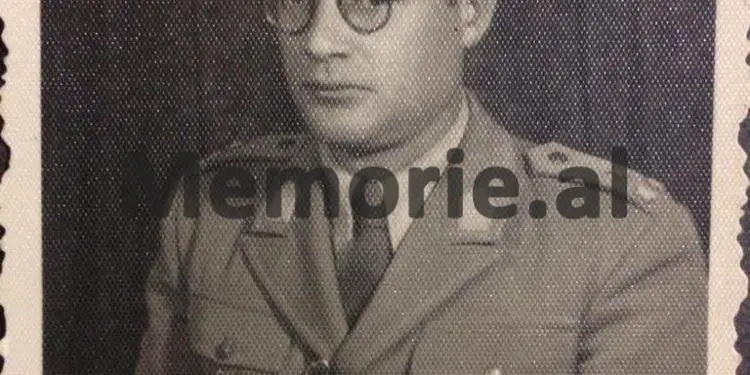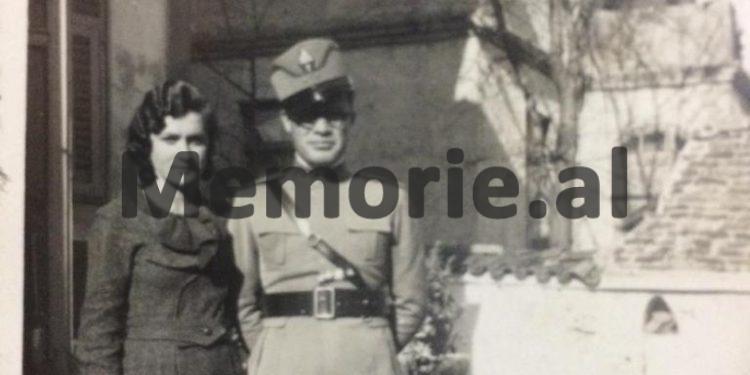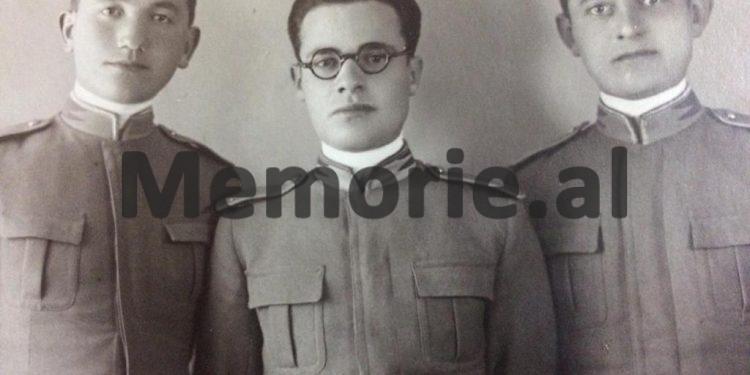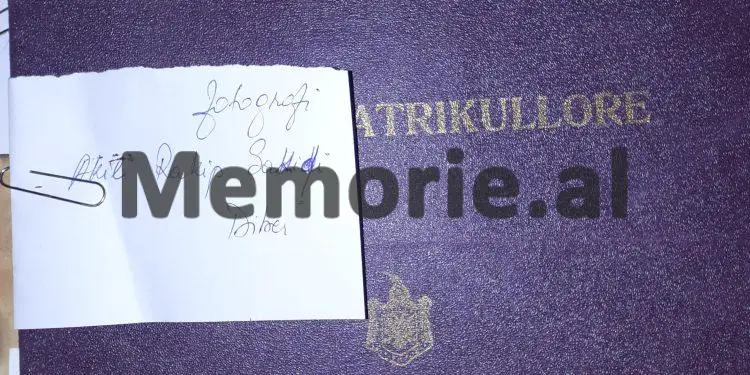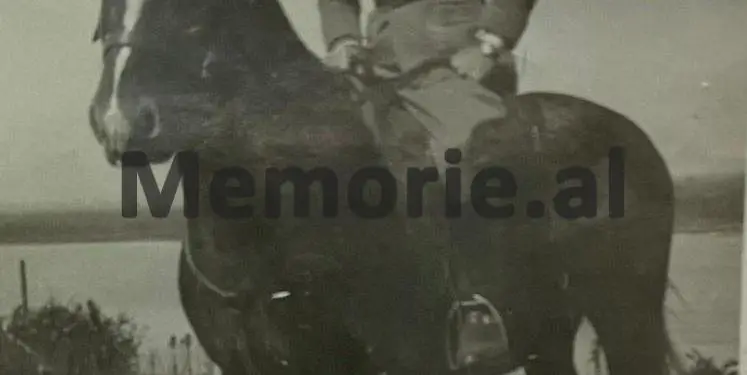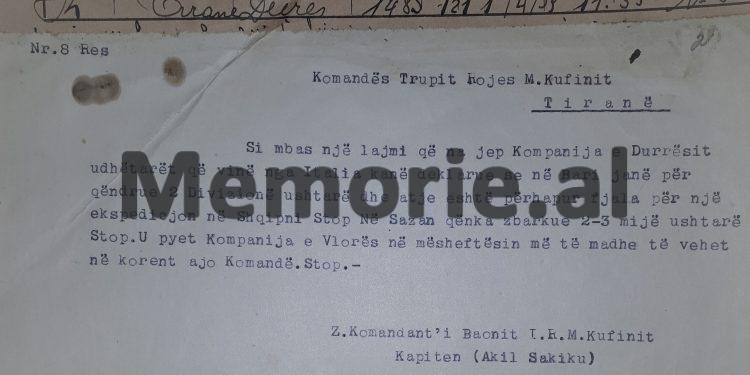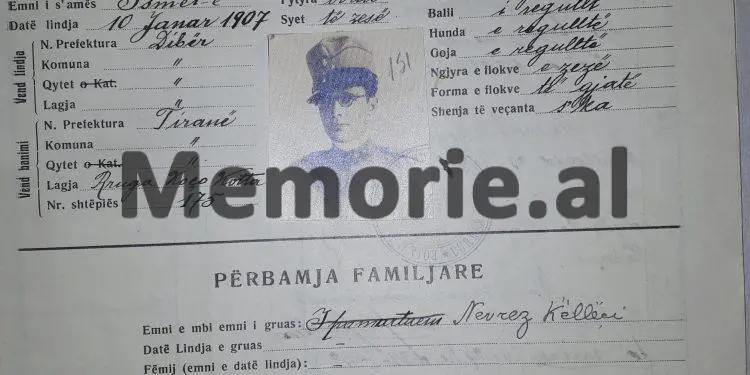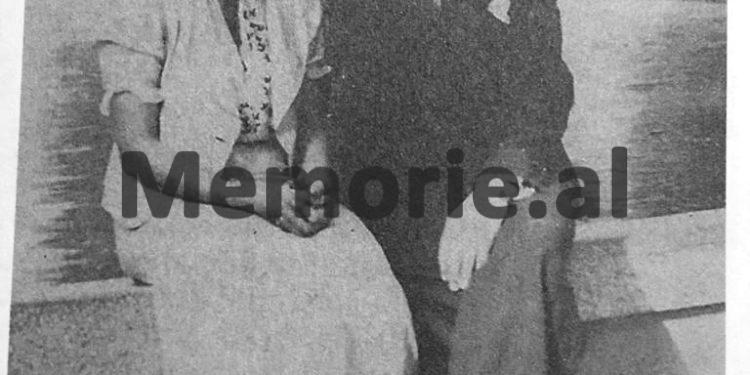Dashnor Kaloçi
Memorie.al publishes the unknown story of Akil Sakiqi, originally from Dibra e Madhe, suckling of one of the most famous and rich families of that province, (his father, Rakipi was engaged in trade and owned about 1500 ha of land and property others in Janica near Thessaloniki), who thanks to the good economic situation of the family, after being educated in Istanbul and Ioannina, in 1923 returned to his homeland and studied at the French Lyceum of Korça, where as a classmate and dormitory room, there was also Enver Hoxha. Sakic’s military career during the period of the Zog Monarchy after he had acquired a study right from the government of that time and had graduated from the Military Academy of Rome in the branch of “Guard of Finance” where he received the rank of lieutenant, serving as an officer of the ‘Border Guard’ in the region of Shkodra, until 1938, when by royal decree he was transferred to the district of Durres, with the duty of deputy commander of the battalion, where he found and April 7, ’39, when Benito Mussolini’s fascist Italy, carried out military aggression by invading its Adriatic neighbor, King Zog’s Albania. Sakiq’s military career during the occupation of the country, where after the amnesty granted by the Italian authorities in April ’39, (for all those Albanian soldiers who had waited with guns for the occupation), serving as an officer of the Guard of the Border ”in the district of Shkodra, where he stayed until 1943 when he was appointed in Tetovo and after the capitulation of fascist Italy in September of that year, he returned to Tirana, where he lived with his family in a rented apartment in Pisha Street, until October 28, 1944, when a partisan unit took him from his house and executed him somewhere in the ‘River Bank’, together with his two friends, Nazmi Uruçi and Fahri Dabulla, the remains of whose are still not found today… ?!
On April 7, 1939, 82 years ago when Benito Mussolini’s fascist Italy carried out military aggression by invading its neighbor across the Adriatic, Albania, a large part of the Albanian military of the Zog Monarchy, such as: Colonel Sami Koka, major Abaz Kupi, Captain Kadri Rustem Bardulla, Captain Nuredin Pustina, Captain Nikoll Mëlyshi, Lieutenant Myftar Jegeni, etc., welcomed the Italian occupying forces with weapons, as in Durrës, Vlora, Shengjin, Saranda, etc., making a symbolic resistance, so as much as a small army in numbers and military equipment (such as that of the Bird Monarchy) could do against one of the greatest military powers of the time, such as the Italy of Benito Mussolini and King Victor Emmanuel III. But that resistance of those few Albanian soldiers of the Monarchy, not only was never mentioned by the official historiography and propaganda of the communist regime of Enver Hoxha, for almost 45 years, but on the contrary, they were labeled as “enemies and traitors” and most of them ended up in prisons and internment camps as political prisoners. While the only military of the Monarchy that the communist regime would declare “Martyr of the Fatherland”, and would be proud of, considering it as “a symbol of the armed resistance of April 7, ’39”, was Mujo Ulqinaku, a Captain of the Guard of Finance, who lost his life during the landing of Italian fascist troops in the port of Durres, fighting against them. One of those military soldiers of the Zog Monarchy who fought on April 7, ’39 in Durrës, was Captain Akil Sakiqi, who was executed by partisan units in November 1944, before the end of the war, being a among the first victims of communist terror in the city of Tirana, along with many other intellectuals, who were taken from their homes and executed without trial, as happened with the event known after the ’90s as the “Massacre in Bristol Hotel, where the Communists executed 33 innocent intellectuals. For more about Akil Sakiqi and his entire history, we will get to know him in this article that we have prepared with testimonies of people who knew about it, such as the memoirs of former soldiers of the Monarchy, colleagues of Akil Sakiqi, as Lieutenant Nuredin Pustina, the memories of Enver Hoxha (Sakiq’s classmate at the Lyceum of Korça) from the testimonies of his family, various scholars and historians, as well as from many archival documents, which Memorie.al makes public for the first time in this article.
From the Lyceum of Korça, to the Military Academy of Rome
Akil Sakiqi was born in July 1907 in Serez, Greece, where his father Rakipi had emigrated from Dibra e Madhe in 1870, whence the origin of that family is one of the most famous of that patriotic province. Achilles received his first lessons first in Istanbul in Turkish and then in Thessaloniki in Greek. Achilles’ education became possible due to the good economic situation of the family, as his father, Rakipi, in his youth, engaged in commercial activity and managed to own about 1500 ha. other land and property in Janica near Thessaloniki, which has been confiscated for several decades, as well as most of the property of Albanians in Greece, mainly the Chams. In 1923, after the Treaty of Lausanne for the exchange of population, with the encouragement of his brother-in-law, the well-known patriot, Hafiz Xhemali, (after his father, Rakipi died in 1918), Achilles came to the homeland and in the years 1923 – ’28, he attended the French Lyceum of Korça, which he graduated with honors in 1931. During the time that Achilles attended the French Lyceum, he had close friendships with Fari Dabulla and Nazmi Uruçi, both classmates of that lyceum and the three of them had the opportunity to meet Enver Hoxha, who was initially a student of that high school and later as a French teacher. Regarding this, Enver Hoxha has written in his memoirs, (Book “Years of Youth”, Tirana 1983, p. 62), where he describes his classmates and their ‘adventures’, among other things he says: “This way of ‘ironing’ was done especially on Saturday nights, to be ready for the usual walk we did on Sundays on the boulevards and alleys. Shaqiri was also the dance master of our room. He taught us ‘Charleston’! All of us in the room stood at the foot of the beds and threw the ‘Charleston’, while Shaqiri himself stood at the top of the room, danced without leaning like us, and sang “… Baby Charleston”, with which our dances were accompanied, throwing back and forth the wide skirts of the trousers. Our room had seen many things: the quarrels of Akil Sakiq (who became Zog’s officer and continued as such even during the fascist occupation) with Ismail Topçi; Lezo Çami’s 31st game (he also ended up in prison as a ballist), a game that started, as the Korçars say, in Shënvasil (Religious holiday, coincides with New Year’s night) (of course hidden asia) and ended exams”.
Marriage to Nevrez Këlliç, the daughter of a member of the Albanian Parliament
After graduating with honors from the French Lyceum of Korça in 1931, Akil Sakiqi received a state scholarship from the government of the Zog Monarchy to pursue higher studies at the Military Academy of the ‘Guardia di Finanza’ in Rome, (“Rojes of Finance”), which he also finished with high results in 1934, receiving the rank of lieutenant. After that, he returned to his homeland where by royal decree, he was appointed as an officer in the “Border Guard” of Shkodra district, where he served until mid-1938. While serving in the district of Shkodra, among in the 1930s, Akil Sakiqi got engaged to a young girl from the well-known Tirana family, Këlliçi, Nevrezin, who was the daughter of Masar Këlliçi, a well-known personality during the period of the Zog Monarchy (MP of Tirana in the Parliament first Albanian in April 1921), and also the granddaughter of Mytesim Këlliçi, the Tirana delegate to the Lushnja Congress in January 1920. Achilles and Nevrez Këlliçi, who worked as a teacher, started a family, crowning their marriage in Tirana. in 1937, from where you will later have two children: son Orhani and daughter, Emeli.
April 7, 1939, Captain Akil Sakiqi fights in Durrës
In 1938, after receiving the rank of captain, Akil Sakiqi was transferred to the city of Durrës with the duty: deputy battalion commander, where he found him on April 7, ’39, when the fascist Italy of Benito Mussolini, carried out military aggression by occupied by force of arms its neighbor, Albania, on the other side of the Adriatic. Located in the epicenter of the Italian occupation on the coast of Durrës, Akil Sakiqi was one of those soldiers of the Zog Monarchy who welcomed the occupation with weapons, making that symbolic resistance, as much as a small army like the Albanian one could do where he was effective, against the Italian army, one of the greatest military powers of the time. But as it is already known, the contribution and resistance of the military of the Zog Monarchy, such as Kadri Rustem Bardulla, Nuredin Pustina, Nikoll Mëlyshi, Myftar Jegeni, etc., who welcomed the Italian occupying forces with weapons on April 7, ’39, as in Durrës , Vlora, Shengjin, Saranda, etc., not only were never mentioned by the historiography and propaganda of Enver Hoxha’s communist regime, but on the contrary, they were labeled as “enemies and traitors” and most of them ended up in prisons and camps. of internments, as political prisoners. And the only military of the Monarchy that the communist regime would declare “Martyr of the Fatherland”, and would be proud of it by consolidating it as a symbol of the armed resistance of April 7, ’39, was Mujo Ulqinaku, a captain of the Finance Guard, who lost his life during the landing of Italian fascist troops in the port of Durres, fighting against them. But the contribution of Captain Akil Sakic as a soldier in the armed resistance of April ’39, is not only documented by some of the few memories of his military colleagues who were together at the time serving on the coast of Durres, which were made public only after the ’90s, as captain Nuredin Pustina, but also from some archival documents that Memorie.al has been able to find recently.
Memoirs of Captain Nuredin Pustina to Akil Sakic on 7 April ‘39
In the memories of Captain Nuredin Pustina, which we have made public thanks to the kindness of his family that made them available to us years ago, (Dossier “Gazeta Shqiptare”, dated 9.VII.2002, author Dashnor Kaloçi), among other things, it is stated: “On April 5, 1939, many officers of different ranks were taken from the school and after being assigned to the wards, they were sent to the front. I went to Durrës and immediately left the family for Korça, to be cheaper. Those two days and two nights, I was part of the Operational Command Headquarters in Durrës. On the sixth of April and the night of the seventh of April, we deployed the forces that came to Durrës, like the heavy artillery that we took to the Church from the road to Villa, commanded by the artillery lieutenant, Nazmi Baraka and Gaqo Mosko.
On April 7, they were the first to fire against the enemy fleet that had concentrated most of the warships in front of the Durrës pier. From the shells of these cannons, they also fell on the steamer that was the Italian colonel Petinasi, who had previously been the commander of the Artillery of the Albanian Army and when he later came to Tirana, he said: ‘I taught you to shoot well with cannons, but not against me ‘. On the night of April 6, in the evening, we sent dynamite to Shijak and demolished the Shijak bridge, where we stationed the Infantry units coming from Elbasan, Tirana, and other districts. After two o’clock at night, Captain Mujo Ulqinaku left me and in the morning, he went to Marina, to the Castle, near the Port. When we parted he told me he was going to leave the ring he had in his hand and we never saw each other again. Before leaving I gave him weapons from the depot. A few days ago, when I was coming from Tirana to my family in Durrës, Mujo reported to me that the Italians serving in our Navy were removing the needles from the large balls that were in the fortifications near the Villa and on the way to the Church. I reported this to the Chief of Transportation at the Defense Command, Captain Ibrahim Ishmi, who informed the General, the Commander of the Defense, and from him, the notification was given to the Commander of the Navy in Durrës, warning the Italians of the Defense Command. The Italians heard Mujo’s information and did not seem to forget it until they killed him. I, with the depot officers, had no soldiers under command, but we went ourselves to the front line. I joined the Border Guards under the command of the Border Commander, Captain Kadri Rustemi (from Dibra). He called Captain Akil Sakic, who was the Battalion commander, and told him: The Italians came down to the ground (on the pier) and started walking towards us. The company had taken up position opposite the Bank, near the pier. The connection with Tirana was cut, then Kadriu pulled out his revolver and fired first. That was the sign, the order of fire. Then the fire of the whole company began. All the wards wherever they were started the fire. The Italians were caught by surprise, as they did not expect that there would be resistance. Then the Italians withdrew, got into the steamer, but were hit hard by many of them. He was killed and seriously injured. These were immediately sent to Italy, but a few days later we saw the former commander of the Navy, Major Tedei, and other marshals, with their arms tied and wounded. The Italians, after getting into the steamers that were standing on the pier, pulled out other weapons and tanks, started the offensive with heavy weapons in all directions, that is, towards us who were near the Bank, from the Hotel to the castle, to Currilat, to AGIPI, on the beach, opposite the Dajlan Bridge, etc. The enemy navy started firing from the sea and some shells also fell on the Flour Factory. Shortly afterwards, the prisoners came to the front line and, after being armed, lined up to fight. We met some of them later in Shijak, I took them in the car to Tirana, they were injured. By order from Tirana I was immediately sent to the Truck Auto Department in Xhafzotaj-Durrës (where I served as an officer) to prepare other vehicles for mobilization. Under the bullet, I went to Durrës with a truck and there I prepared fifteen trucks and left for Durrës. When I arrived in Rrashbull the enemy had just fired heavy artillery, so it was impossible to cross and we took refuge in a ditch. Enemy planes flew over our heads. After a while, the friends we had left in Durrës started coming, who were withdrawing by order. Then we joined and headed to Tirana. When we arrived at Hani i Hamit Bey, in front of Vora, we found a battalion that had taken up a fighting position. We were also invited to take up positions. We accepted and stopped. After a while, this department will leave for Tirana. On April 8, Tirana was occupied by enemy armies and the King and government fled to Greece. On April 12, I return to Durrës. The first job I did I looked for Mujo’s family because I knew it was bad financially. I contacted them through Sul Kapedan and they asked me for financial help. Then I collected 12 gold napoleons and gave it to him. They went to Seman, to their uncles “, concludes the story of Nuredin Pustina, regarding the event of April 7, 1939, where he supplied Mujo Ulqinaku with weapons and also talks about the contribution of his colleague, Captain Akil Sakiqi.
Captain Sakic’s assets in April ’39, in archival documents
The contribution and activity of Captain Akil Sakiqi in the events of April ’39, when fascist Italy carried out the military aggression against Albania, in addition to the various testimonies that we have mentioned in this article, is confirmed by a series of archival documents that Memorie.al publishes for first time. Thus, in a telegram dated April 1, 1939, it is written:
Border Guard Corps Command
T i r a n ë
According to a news given to us by the Durrës Company, the passengers coming from Italy, have stated that in Bari, two Division soldiers are concentrated and there is word about an expedition to Albania. Stop. In Sazan, 2-3 thousand soldiers have landed. Stop. The Vlona Company was asked and in the greatest secrecy that Command was put in the current. Stop.
Zv. Commander of ‘Baon. U.R.M. boundary of the property
Captain (Akil Sakiqi)
Another document dated April 6, 1939 states:
General Command R. M. Border
T i r a n ë
No.8 / 32 Res.
Stop orders were given to Colonel Ali Razi and Major Sabri Gjilani, when they arrive, we will inform you of Stop.
Zv. Commander Baon and R.M. boundary of the property
Captain (Akil Sakiqi)
Proven: Decryption
Captain Kl. I -rë
Ahmet Shehu
Akil Sakiqi, officer in the Albanian National Army
Based on the stance taken by Captain Akil Sakiqi during the first days of April ’39, taking part in the armed resistance on the coast of Durrës against the Italian military troops of Benito Mussolini that landed in the port of Durrës, about a month later , an arrest warrant was issued against him by the Italian authorities and to escape this, he was able to leave and hide with some of his loyal friends in the district of Durrës. After an amnesty granted by the Italian authorities to all Albanian soldiers who had been waiting for them with rifles, Akil Sakiqi returned to duty and was initially appointed in the district of Shkodra, as an officer of the “Border Guard”, for the area of Malësia e Madhe, but with offices in the city of Shkodra. He served in that position until the beginning of 1943, when he was appointed in Tetovo and from September of that year with the capitulation of fascist Italy, he returned to Tirana and with his family settled on “Rruga e Pishës”, renting a house. From that time until the end of October 1944, (when he was to be arrested by a partisan unit), although he did not engage in politics at all without interfering at all in the affairs of the War, he was convinced. nationalist and hated the communists. According to some testimonies given by Jahja Hatibi in the early 80’s (which is also confirmed by his family), sometime in 1944, when he (Jahja Hatibi) was sheltered in Achilles’ house, he asked who they had a main communist leader and when Jahja told him that they had Enver Hoxha, Achilles had replied: Albania will not be good, so as a friend I have to tell you to leave it as soon as possible. I have read a lot about communism and as long as he leads this movement, it seems that he has found the “pot, the lid”. “In the beginning he will deal with us, but he will not be late, and it will be the turn of you who follow him.” According to some testimonies, Jahja Hatibi often mentioned the conversation that took place in 1944 in the house of Akil Sakiqi where he took refuge as illegal (as he was a member of the Communist and Anti-Fascist Movement), stating that he had made many mistakes that he did not have. listen to Achilles’ advice./Memorie.al
Continues in the next issue




